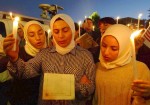by Steven Philp
 While the media spent the morning of September 11 replaying footage of the terrorist attacks of that day in 2001, small groups of people gathered across the country to show that wounds can heal with faith and conviction, if not time. These gatherings on that day brought together Jews, Christians and Muslims to remember those who lost their lives in the attacks, and to show a renewed commitment to developing bonds between our different faith communities. According to Haaretz, approximately 15 interfaith memorial services were planned for New York City alone, with others taking place in major cities across the United States – including Los Angeles, Chicago, Miami, and Washington, DC. The first official interfaith gathering occurred on Friday, September 9, when more than 2,000 individuals crowded into a mosque in uptown Manhattan; the service was officiated by head imam Ali Shamsi, two rabbis and two priests. Raymond Kelly, Commissioner of the New York City Police Department was also in attendance.
While the media spent the morning of September 11 replaying footage of the terrorist attacks of that day in 2001, small groups of people gathered across the country to show that wounds can heal with faith and conviction, if not time. These gatherings on that day brought together Jews, Christians and Muslims to remember those who lost their lives in the attacks, and to show a renewed commitment to developing bonds between our different faith communities. According to Haaretz, approximately 15 interfaith memorial services were planned for New York City alone, with others taking place in major cities across the United States – including Los Angeles, Chicago, Miami, and Washington, DC. The first official interfaith gathering occurred on Friday, September 9, when more than 2,000 individuals crowded into a mosque in uptown Manhattan; the service was officiated by head imam Ali Shamsi, two rabbis and two priests. Raymond Kelly, Commissioner of the New York City Police Department was also in attendance.
Although the event was held in remembrance of those who lost their lives on September 11, the memorial service also focused on the need for coexistence between American religious communities. “We’ve defeated the terrorists,” explained Imam Shamsi in an interview with Haaretz. “The terrorists who acted on September 11 sought not only to kill innocent people, but also to divide the public and sow hate among us, to incite man against his fellow man. But they failed.” Shamsi participated in a total of eight interfaith services, taking place in churches, mosques and synagogues across Queens. He explained the need for people of different religious communities to enter each other’s places of worship, to get to know their neighbors first hand. “The attackers wanted and still want the believers of different religions to hate one another,” Shamsi said. “But in the wake of the attacks, we’ve become closer.”
Unfortunately, not all American religious communities share Shamsi’s positive outlook. Only last year several Christian and Jewish organizations–including the Southern Baptist Convention and the Zionist Organization of America–mounted demonstrations against Park51, a proposed Muslim community center breaking ground two blocks away from the World Trade Center Memorial in downtown Manhattan. Although containing a large Muslim prayer space, proponents have been quick to point out that Park51 is not a mosque–in fact, the majority of its facilities will be open for use by the general public, including a small memorial to the victims of September 11.
It is a testament to the perseverance of individuals like Imam Shamsi that such a large number of interfaith memorial events occurred. Perhaps in our shared grief it has become apparent that internal divisions need to be considered and–with a building of mutual respect and understanding–be placed aside. “The relationships between American Jews and Muslims have become tightly knit, and evermore significant,” said Shamsi.
This hopeful sentiment was echoed by Rabbi Marc Schneier, head of the Foundation for Ethnic Understanding. Speaking to Haaretz, he explained, “Ten years ago there were no ties between Jews and Muslims in the United States. Today they exist, and are experiencing a blossoming of cooperation.”
Tags:
- 9/11, interfaith, jewish, mosque, muslim

One thought on “The Long and Winding Road to Interfaith Dialogue”
“Interfaith dialogue is a must today, and the first step in establishing it is forgetting the past, ignoring polemical arguments, and giving precedence to common points, which far outnumber polemical ones.” (Fethullah Gulen)
Fethullah Gulen
Fethullah Gulen News
More